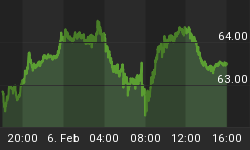Since 9/11 the US money supply has rocketed by about 70 per cent*. (The Clinton presidency was just as bad). The problem is one of bad economics, not bad investment decisions, wild speculation, the housing boom, the falling dollar, the current account deficit, the domestic deficit, etc. The vast majority of economic pundits have only a dim understanding of the link between the money supply and America's current economic difficulties.
As for politicians, the range from the hopelessly confused to the dangerous irresponsibility of Democrats like Mr Obama whose ignorance of economics and economic history is easily on par with Pelosi's ignorance and stupidity. And that is truly frightening.
At one point the Fed's reckless monetary policy had driven down short-term interest rates to the point where became negative. This was bound to trigger a housing boom, fuel stock market speculation, drive down up the current account deficit, etc, etc, etc. All the easily recognized symptoms of a boom once again appeared. And once again the economic commentariat missed the real story.
In a closed economy forcing the interest rated down sets of an investment boom that leads malinvestments that have to be abandoned once the boom comes to an end. However, in an open economy things are not quite so straightforward. An exploding money supply rapidly expands the demand for foreign goods. This would not matter very much if the world was on a gold standard. But a world that is on a paper standard that is subject to political manipulation is a different beast altogether.
(Despite the views of some lunatics, it is not a Jewish cabal that manipulates the world's money supply but central banks, sometimes under pressure from cynical and ignorant politicians).
When a country's currency is over-valued economic commentators focus on the current account deficit. What they fail to see is that if the central bank does not take action to reign in the money supply the over-valued currency will result in a reverse J-curve. Every first-year economics undergraduate knows -- or should know -- that a depreciating currency will reduce imports and encourage exports.
However, an over-valued currency will have a reverse effect that could lead to factories closing down and moving their operations abroad. This in turn will encourage politicians to court discontent over the situation by demanding curbs on imports. In effect the over-valuation is akin to a tax that can destroy a country's comparative advantage. David Ricardo was certainly alert to this situation, pointing out that:
A new tax too may destroy the comparative advantage which a country before possessed in the manufacture of a particular commodity. (David Ricardo, Principles of Political Economy and Taxation, Penguin Books, 1971, p. 269).
Nevertheless economic commentators still insist on talking about the pattern of trade being determined by comparative advantage, completely oblivious to the fact that the free trade argument was originally couched in terms of a gold standard. Anyone who is acquainted with the "bullion controversy" would understand this. In other words, trade theory was formulated within the framework of a stable monetary policy, a fact that Joseph Schumpeter made clear when he wrote that
the 'classic' writers without neglecting other cases, reasoned primarily in terms of an unfettered international gold standard". (The History of Economic Analysis, Oxford University Press, 1994, p. 732).
The above is not an argument against free trade but a warning that a bad monetary policy will also distort the pattern of foreign trade in the same way that it distorts the domestic capital and price structures.
It is always observed that in times of a boom financial intermediaries eventually begin to start taking risks that in normal times would be considered utterly reckless, sometimes turning into a speculative frenzy, much like tech stock during the Clinton administration. But this always happens when a boom is allowed to go unchecked for sometime. Benjamin M. Anderson referred to a speech that was made in 1929 before the New York State Chamber of Commerce
which discussed, among other things, the phenomena of a mob mind which had been so manifest in the year and a half that had preceded the crash. The speaker made the generalization, familiar to social psychologists, that the more intense the craze, the higher the type of intellect that succumbs to it. (Benjamin M. Anderson, Economics and the Public Welfare: A Financial and Economic History of the United States 1914-1946, LibertyPress, 1979, p. 203).
Two fallacies lie at the root of the boom-bust-cycle. The first one maintains that the money supply needs to be manipulated to maintain a stable price level. According to this view the great depression should never have happened: that's why it took Irving Fisher by surprise, severely denting his reputation as an economist. The second one asserts that money supply needs to expand to maintain purchasing power. Anyone truly acquainted with Say's law will immediately realize what is wrong with this theory. (William H. Hutt, A Rehabilitation of Say's Law, Ohio University Press: Athens, 1974).
The Brookings Institution predicted that the tax rebate for consumers would raise GDP through increased spending on consumer goods to the extent that it would more than compensate the government for any loss in tax revenue. It was a complete failure. Just about any classical economist would have predicted this. Using Say's law he would have pointed out that
What a country wants to make it richer, is never consumption, but production. Where there is the latter, we may be "sure that" there is no want of the former. (John Stuart Mill, Essays on Economics and Society 1824--1845, Liberty Fund, 2006, p. 263).
*The Austrian definition of the money consists of the following:
Currency Component of M1, Total Checkable Deposits, Savings Deposits, U.S. Government Demand Deposits and Note Balances, Demand Deposits Due to Foreign Commercial Banks, and Demand Deposits Due to Foreign Official Institutions.















